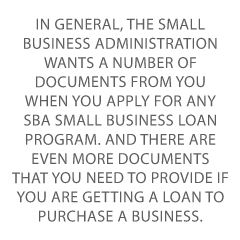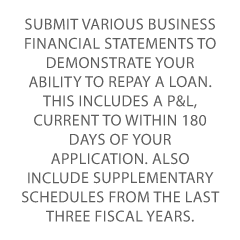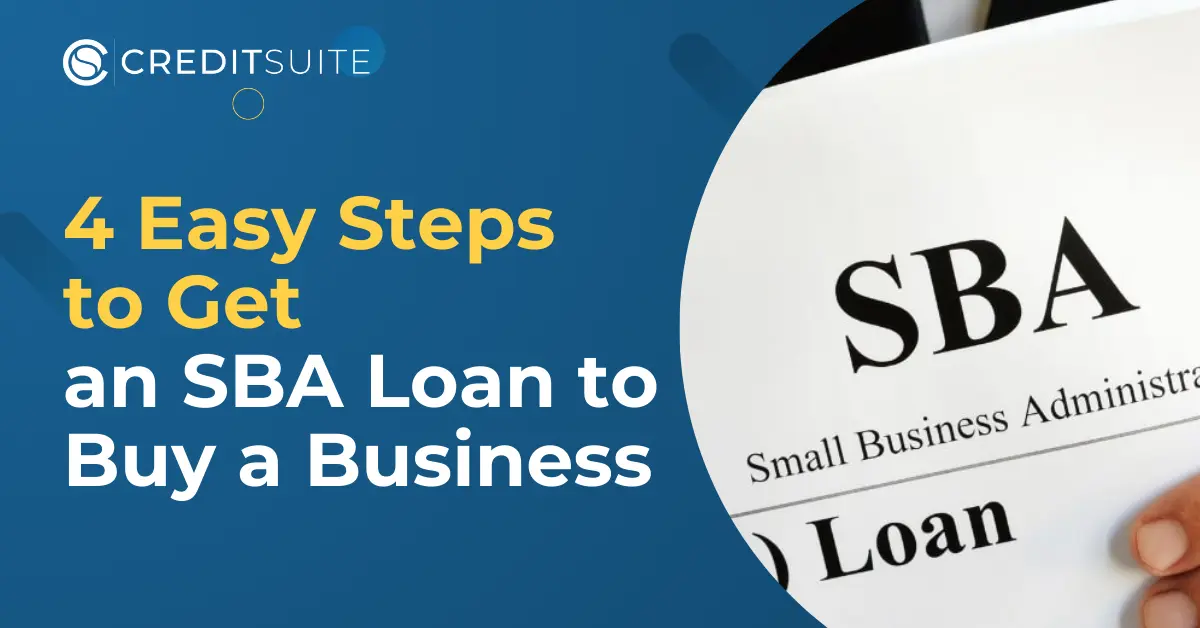Whether you’re just starting out or want to break into a new industry, an SBA loan to buy a business should be on your radar.
SBA loans offer great rates and terms, and you can often get more financing with them. But keep in mind that you generally need a better FICO score to qualify.
Can you Buy a Business Using an SBA Loan?
Yes, absolutely! In fact, the Small Business Administration may very well prefer that you do, seeing as they can check records of how the business has been doing financially.
 In general, the Small Business Administration wants a number of documents from you when you apply for any SBA small business loan program. And there are even more documents that you need to provide if you are getting a loan to purchase a business.
In general, the Small Business Administration wants a number of documents from you when you apply for any SBA small business loan program. And there are even more documents that you need to provide if you are getting a loan to purchase a business.
Among SBA loan programs, an SBA 7a loan is probably your best business financing option.
An SBA 504 loan has more restrictions and tends to be more for buying or improving commercial real estate or buildings. For either type of small business loan for business acquisition, you can get as much as $5 million.
But don’t count out microloans. You can only get up to $50,000 from this SBA loan program. But combined with your own funds, or another form of small business financing (like a business credit card), this smaller term loan could be enough to buy an existing business.
There is also the SBA Express loan, with a term loan amount of up to $350,000.
Also, keep in mind:
“Loans for {change of ownership} are eligible provided the business benefits from the change. In most cases, this benefit should be seen in promoting the sound development of the business or, perhaps, in preserving its existence. Loans cannot be made when proceeds would enable a borrower to purchase: (a) part of a business in which it has no present interest or (b) part of the interest of a present and continuing owner. Loans to effect a change of ownership among members of the same family are discouraged.”
Requirements for a Business Acquisition Loan
For any SBA loan, your business must operate for profit; be engaged in, or propose to do business in, the U.S. or its territories; have reasonable owner equity to invest; and have used alternative financial resources, including personal assets, before seeking financial assistance.
For buying an existing business, you will need to provide:
- A current balance sheet and profit and loss statement
- All federal income tax returns for the previous three years
- The proposed bill of sale including the terms of sale
- The asking price with a schedule of inventory, machinery and equipment, and furniture and fixtures
- Franchise, jobber, or licensing agreements as applicable
- Proof of equity financing
The SBA will also require that you fill out some of its forms and provide a profit and loss statement and projected financial statements. They will also want a copy of each applicable business license or certificate.
The SBA will ask for personal and business tax returns and resumes from each principal owner. In general, you will need to have a personal credit score of 640 or better. For a microloan, you can probably have a 620 credit score and still get credit approval.
If the business has its own business credit, it should have a FICO SBSS credit score of 150 or better (out of 300).
How to Apply for an SBA Loan
While each SBA-preferred lender will have its own credit and document requirements, there are still some universal steps.
Step 1 – Go to SBA Lender Match and Find a Lender
Before you get started, you must determine if you can find a lender you can work with in the first place. The Lender Match tool will ask you some questions about your business and your purpose(s) for the loan program you’re seeking.
Also, check out their list of the most active Small Business Administration lenders. The bank which does the most SBA lending in your state may not even be based in your state. They could even be an online financing company, like Funding Circle.
Also, make sure that you would not disqualified. For the most part, you must have:
- A credit score of 690 or better
- No bankruptcies within the past three years
- A 10% down payment or more
- For franchisees, a paid franchise fee before SBA financing is released
- A clean criminal history, or at least you can explain any misdemeanors on your record
- No current federal debt
- Industry or managerial experience (to prove you can run the business you’re buying)
Step 2 – Gather Materials You Need for Any SBA Loan
Once your loan package is complete, your lender submits it to the SBA. You need:
- Business financial statements:
- P&L current within 180 days of application, with supplementary schedules from the last three fiscal years
- A detailed, one-year projection of income (from cash flow) and finances. Explain how you expect to achieve this projection
- Names and addresses of any subsidiaries and affiliates, including concerns, where you hold a controlling interest or that otherwise connect to you
- A copy of the original business license or certificate of doing business. If incorporated, stamp your corporate seal on the application
- Records of any small business loans you applied for in the past
- Signed personal and business federal income tax returns of business principals for the past three years
- Personal resumes for each principal
- Business overview and history of the business and its challenges. Explain why you need the loan and how it will help your business
- A copy of your business lease, or a note from your landlord, with the terms of the proposed lease
Step 3 – Gather the Additional Documents You Need for an SBA Loan to Purchase a Business
There are more requisite documents for purchasing a business that is currently in existence.
If you are buying an existing business, you will need to get together the following information:
- The business’s current balance sheet and profit and loss statement
- All federal income tax returns for the previous three years
- The proposed bill of sale including the terms of the sale
- The asking price with a schedule of inventory, machinery and equipment, and furniture and fixtures
- Any franchise, jobber, or licensing agreements
- Proof of your own equity financing
Note: a small business owner may be required to submit even more SBA forms based on the specific use of the proceeds or fees paid on a small business loan package or to a broker or agent.
Always be sure to contact your preferred SBA lender and find out if they will want anything else.
Step 4 – Fill Out the Application (and Wait!)
Filling out the application means sending more than one completed document.
Business owners will need to complete SBA Form 1919 and submit it to an SBA-participating lender. This is the Borrower Information Form.
The purpose of this form is to collect identifying data about the applicant, loan request, indebtedness, principals of the business, and information on any current or previous government financing.
The information also makes it easier for a lender to do background checks as authorized by Section 7(a)(1)(B) of the Small Business Act, 15 U.S.C. 636(a)(1)(B). This form is to be completed by the Small Business Applicant. You then submit it to an SBA Participating Lender.
You will also need to complete SBA Form 413, which is a personal financial statement. The SBA will use this information to determine if you can pay back a business loan. They will also use it to check your creditworthiness.
Documentation Needed for an SBA Loan
The SBA is well-known for needing a lot of documentation before they will loan a small business any money. But they will want even more if you want to get a loan from them to purchase a going concern.
The loan package must be complete before a lender can submit it to the SBA. Therefore, it pays to get this information together when you’re still at an early stage in the borrowing process.
You must complete the Borrower Information (SBA 1919) Form and the Personal Financial Statement (SBA form 413).
Submit various business financial statements to demonstrate your ability to repay a loan. This includes a P&L, current to within 180 days of your application. Also include supplementary schedules from the last three fiscal years. 
Send projected financial statements, with a detailed, one-year projection of income (from cash flow) and finances. Explain your business plan to achieve this projection.
Provide a list of names and addresses of any subsidiaries and affiliates, including concerns, where you hold a controlling interest or that are otherwise connected to you.
Send a copy of the original business license or certificate of doing business. Corporations can stamp their corporate seal on the SBA loan application.
Include records of any business loans you may have applied for in the past. Add personal and business federal income tax returns of your business’s principals for the previous three years.
Add personal resumes for each principal, and a history of the business and its challenges. Explain why you need the SBA loan and how it will help your business. Include your business lease or a note with the terms of the proposed lease of the commercial real estate.
For buying a business, add:
- Current balance sheet and P&L
- Federal income tax returns for the last three years
- The proposed bill of sale includes terms
- Asking price with a schedule of inventory, machinery and equipment, and furniture and fixtures
- And franchise, jobber, or licensing agreements
- Proof of equity financing
Takeaways
If you can provide the extensive documentation necessary, then an SBA loan to purchase a going concern can be a terrific way to finance the acquisition and avoid any potential issues with seller financing.
If the requirements are too daunting, or you’re interested in exploring another loan option (like a working capital loan, cash flow financing, a commercial real estate term loan, or business line of credit), contact us today. Let’s take the next steps together. Schedule a FREE Business Financing assessment to explore all of your funding options!

